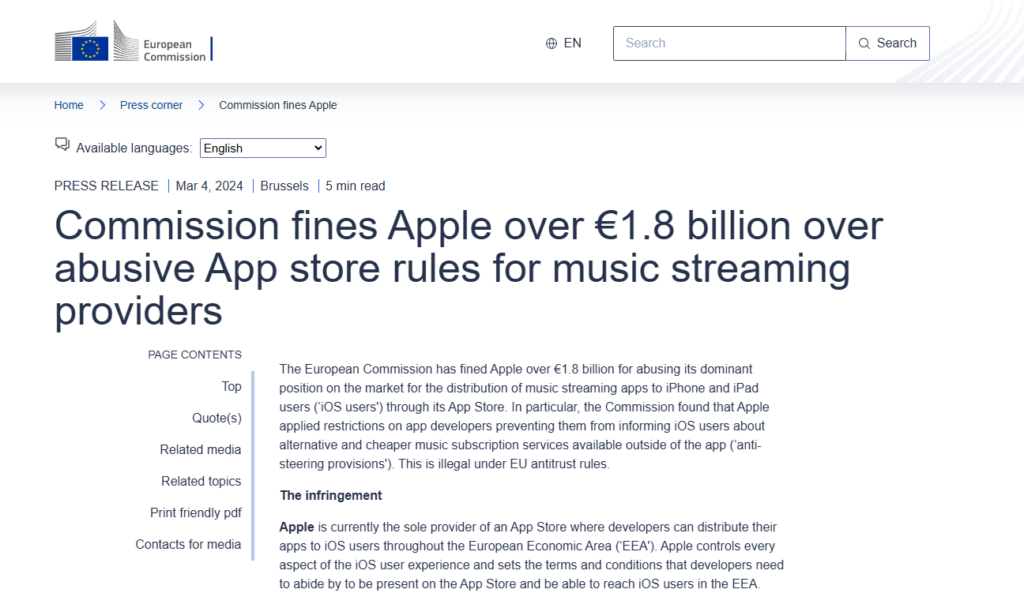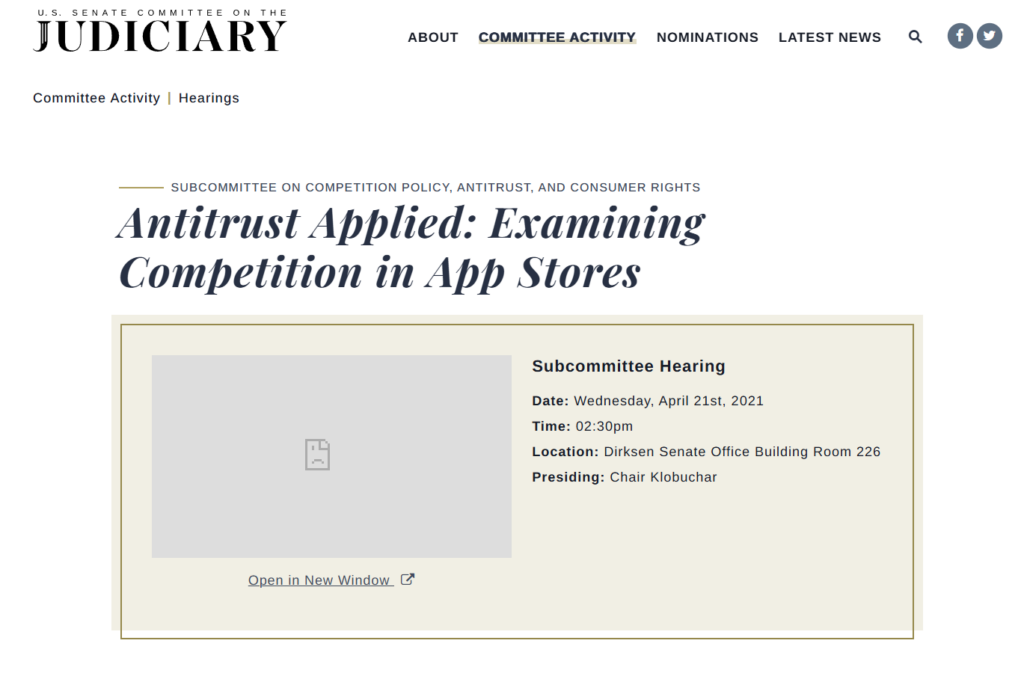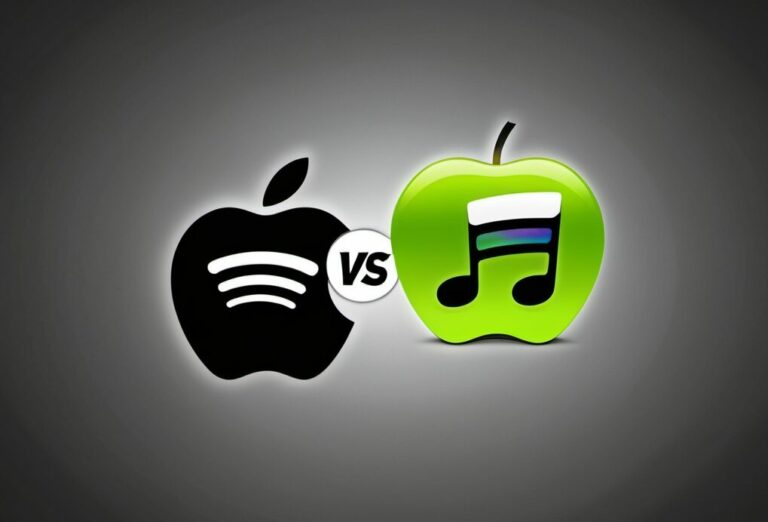In 2015, Apple tried to crush Spotify. The Swedish streaming startup was growing at an unprecedented pace, challenging Apple’s dominance in the digital music space. Threatened by Spotify’s success, Apple took aim with tactics that many deemed ruthless. But Spotify, under the leadership of its visionary founder Daniel Ek, turned the tide in what became one of the most remarkable David-versus-Goliath stories in tech history.
Here’s how Spotify, a company born in Sweden, not only survived Apple’s attempts to stifle it but also emerged as the undisputed leader in music streaming.
Spotify’s Humble Beginnings: From Pirate Music to Streaming Giant
Spotify started in 2006 when a young Swedish entrepreneur named Daniel Ek launched the company in Stockholm. The music industry was having a hard time. Piracy hurt revenues, CD sales dropped sharply, and iTunes was leading in digital music sales. In 2005, illegal music downloads were everywhere, and piracy led to a more than 50% drop in global music revenues. The music industry appeared to be struggling, and many thought that streaming services, still new at the time, wouldn’t be able to make up for the money lost to piracy.
Daniel Ek saw things differently. He thought that a legal and easy-to-use streaming model could help the industry and create a worldwide music platform that would change how people enjoyed music. Ek wanted to create a way for users to enjoy a huge collection of songs legally without needing to buy each one separately.
By 2015, Spotify was already a global sensation:
- 75 million active users
- Present in 58 countries
- Valued at $8.4 billion
Spotify was growing rapidly, and the music industry began to take notice. However, this rapid growth also drew the attention of a new challenger—Apple.
Apple’s Strategy: The Battle for Music Streaming
Apple has long been a dominant force in the technology sector, particularly with its iconic devices and the iTunes Store. However, the landscape of digital music was evolving, with streaming platforms like Spotify, Pandora, and Apple’s own Beats Music emerging as significant competitors. In response to this shift, Apple introduced Apple Music in 2015, aiming to reclaim its position in the music industry.
One of Apple’s key advantages was its control over the App Store, which serves as a crucial gateway for mobile applications. By 2015, the company had over 1 billion iPhones in circulation, providing a vast audience for its new streaming service. However, Apple’s strategy extended beyond just launching a competitive product; it employed aggressive tactics to undermine its rivals, particularly Spotify.
Apple implemented several strategies designed to hinder Spotify’s growth while promoting Apple Music. One of the most notable tactics was the imposition of a 30% fee on all subscriptions made through the App Store. Additionally, Apple prohibited developers from including links to alternative payment methods within their apps, forcing users to pay through the App Store.
Spotify’s Genius Response: The War Begins
In a bold response to Apple’s aggressive business tactics, Spotify, led by CEO Daniel Ek, decided to take a stand rather than passively accept the situation. The conflict escalated when Spotify filed a formal antitrust complaint with the European Union, accusing Apple of abusing its dominant market position to stifle competition and harm consumers. This move marked a significant shift in the ongoing battle between the two tech giants.
Apple’s reaction to Spotify’s allegations was dismissive, arguing that Spotify was seeking to enjoy the advantages of a free app without adhering to the associated costs. Apple claimed that Spotify wanted to benefit from the App Store’s extensive distribution network while evading the standard 30% transaction fee that Apple imposes on app developers. This response, however, did not deter Spotify from pursuing its claims.
Instead, Spotify intensified its efforts by launching a dedicated website, TimeToPlayFair.com, aimed at shedding light on Apple’s practices. The site detailed various ways in which Apple allegedly obstructed Spotify’s operations, including hindering app updates, limiting features, and restricting integration with Apple devices.
The Battle Escalates
As Spotify’s public battle with Apple intensified, it became a turning point not just for the two companies but for the entire tech ecosystem. The implications of Apple’s practices—and Spotify’s defiance—resonated across industries and continents, sparking widespread scrutiny of Big Tech and its dominance.
The European Union Takes Action
Spotify’s antitrust complaint filed with the European Union marked the beginning of Apple’s regulatory troubles. The EU launched a formal investigation into the App Store, focusing on Apple’s 30% commission and its ban on alternative payment methods. Regulators were concerned about Apple’s potential abuse of its dominant position to stifle competition and harm consumers.

This investigation placed Apple under the global microscope, raising awareness about the significant power imbalance between platform owners and third-party developers.
U.S. Congress Questions Apple
Across the Atlantic, the U.S. Congress began its own probe into Apple’s App Store policies. Lawmakers questioned the tech giant’s influence over app developers, raising concerns about monopolistic behavior. Apple’s restrictions on payment systems and the enforced 30% commission were key topics in antitrust hearings, where Spotify’s case became a cornerstone of the discussion.

This scrutiny was a crucial moment in the broader debate over Big Tech’s power, with Apple, Google, Facebook, and Amazon all facing heightened regulatory and public pressure.
The Developer Community Rallies
Spotify’s fight wasn’t just about one company—it became a rallying cry for other developers who had long been frustrated with Apple’s restrictive policies. Dozens of app developers, large and small, joined the chorus, sharing similar grievances about Apple’s fees, arbitrary app rejection policies, and the lack of alternatives for payment processing.
Spotify’s boldness united the developer community and pushed the conversation forward, signaling that smaller players could challenge tech giants when they stood together.
South Korea Changes the Rules
In an unprecedented move, South Korea introduced new laws aimed directly at addressing issues raised by Spotify and others. These laws required platform owners like Apple and Google to allow alternative payment systems, effectively breaking their monopolies over app transactions.
This landmark legislation was the first of its kind and a clear indication that the tide was turning against platform dominance. South Korea’s actions inspired lawmakers in other regions to consider similar measures, setting a precedent for how governments could rein in Big Tech’s influence.
A Global Conversation
Spotify’s strategic decision to go public with its grievances did more than gain media attention—it ignited a global conversation about fairness, competition, and the responsibilities of tech giants. This wasn’t just a fight for Spotify’s survival; it became a movement advocating for a level playing field in the digital economy.
By rallying support from regulators, lawmakers, and the developer community, Spotify forced the world to confront critical questions:
- Should platform owners have unchecked control over their ecosystems?
- What happens when gatekeepers like Apple abuse their dominance?
- How can the tech industry balance innovation with fairness?
Spotify’s fight with Apple highlighted these issues in stark terms, making it a landmark case in the evolving relationship between Big Tech and the global economy. The reverberations of this battle are still being felt, as governments and developers continue to push for a fairer and more open digital landscape.
The First Victory: The 30% Tax Crumbles
In 2021, Apple faced increasing pressure regarding its App Store policies, leading to a pivotal change that marked a significant victory for Spotify and the broader tech industry. The company was compelled to allow external payment links within apps, a shift that directly impacted its longstanding 30% commission on subscriptions, often referred to as the “Apple tax.” This adjustment enabled Spotify to provide customers with alternative payment options, effectively reducing the financial burden imposed by Apple’s fees.
The implications of this change extended beyond Spotify, signaling a broader accountability for major tech companies regarding their competitive practices. The ruling demonstrated that even industry giants like Apple could be challenged and forced to adapt their business models in response to external pressures.
Growth Amidst War: Spotify’s Unwavering Focus
Spotify has established itself as a leading force in the music streaming industry, demonstrating remarkable growth and resilience, particularly in the face of competition from major players like Apple.
In its third quarter earnings report for 2024, Spotify showcased significant progress across key performance metrics, inching closer to a full year of profitability. Highlights from the report included an 11% year-over-year increase in Monthly Active Users, reaching 640 million; a 12% rise in subscribers to 252 million; a 19% growth in total revenue to €4 billion; a gross margin of 31.1%; and an operating income of €454 million. CEO Daniel Ek expressed pride in the company’s achievements, emphasizing that Spotify is on a steady path toward its long-term goals, driven by a commitment to innovation and user experience.
Spotify’s growth strategy has been multifaceted. A significant aspect of its approach involved publicly addressing its conflict with Apple. By criticizing Apple’s practices, Spotify transformed its challenges into a high-profile issue, garnering public support and highlighting the monopolistic behavior of the tech giant. This transparency resonated with users and developers alike, who shared similar frustrations with Apple’s tactics.
Moreover, Spotify successfully united developers who were also discontent with Apple’s practices, forming a coalition that amplified its voice against the tech giant. This collective effort not only strengthened Spotify’s position but also fostered a sense of community among developers advocating for fair competition in the digital marketplace.
At the core of Spotify’s mission is a relentless focus on user experience. The company has consistently prioritized enhancing its platform to ensure that users enjoy the best possible music streaming experience. This commitment to delivering value has been a driving force behind its impressive growth and user retention.
The End of the Battle: A Stunning Result
Today, Spotify has not only survived its fight with Apple—it has dominated. As of 2023, Spotify boasts over 500 million users, while Apple Music lags far behind with just around 95 million users. Spotify’s dominance in the music streaming world is undeniable, and it’s a testament to the power of strategic thinking, resilience, and innovation.
Spotify, the once “little Swedish startup,” is now 5.5 times bigger than Apple Music. The story of how a small company outsmarted the world’s most powerful tech giant is a remarkable tale of overcoming the odds, and it’s one that will continue to inspire entrepreneurs and innovators for years to come.
In the end, Daniel Ek’s Spotify didn’t just survive the fight—it emerged victorious, reshaping the music industry and proving that even David can defeat Goliath in the world of tech.



